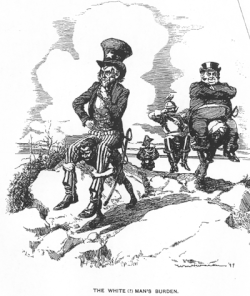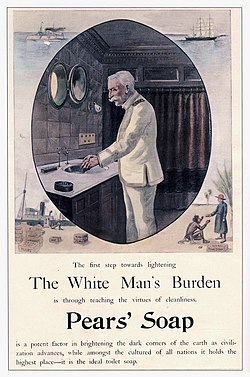Valkoisen miehen taakka
Valkoisen miehen taakka (engl. The White Man's Burden) on Rudyard Kiplingin kirjoittama runo sekä runon pohjalta syntynyt käsite, jolla yritettiin oikeuttaa imperialismi vetoamalla valkoihoisten oletettuun ylemmyyteen.


Kipling kirjoitti "The White Man's Burden: The United States and the Philippine Islands"-runon vuonna 1899 kannattaakseen Yhdysvaltain pyrkimystä vallata Filippiinit. Eurosentristiset ja rasistiset piirit omaksuivat "valkoisen miehen taakan" käsitteeksi, jolla perusteltiin valkoisten siirtomaaherruutta. [1][2]
Runon on suomeksi kääntänyt Antero Manninen, ja se löytyy Kipling-suomennosvalikoimasta Valkoisen miehen taakka (WSOY, 1976).
Runo englanniksi muokkaa
|
Take up the White Man's burden-- Take up the White Man's burden-- Take up the White Man's burden-- Take up the White Man's burden-- Take up the White Man's burden-- Take up the White Man's burden-- Take up the White Man's burden-- |
Lähteet muokkaa
- ↑ Zwick, Jim (December 16, 2005). "Anti-Imperialism in the United States, 1898-1935".
- ↑ Miller, Stuart Creighton (1982). Benevolent Assimilation: The American Conquest of the Philippines, 1899-1903. Yale University Press. ISBN 0-300-03081-9. p. 5: "...imperialist editors came out in favor of retaining the entire archipelago (using) higher-sounding justifications related to the "white man's burden."
- ↑ "The White Man's Burden." McClure's Magazine 12 (Feb. 1899).
Aiheesta muualla muokkaa
- Lisää luettavaa aiheesta The White Man's Burden on Wikiaineistossa